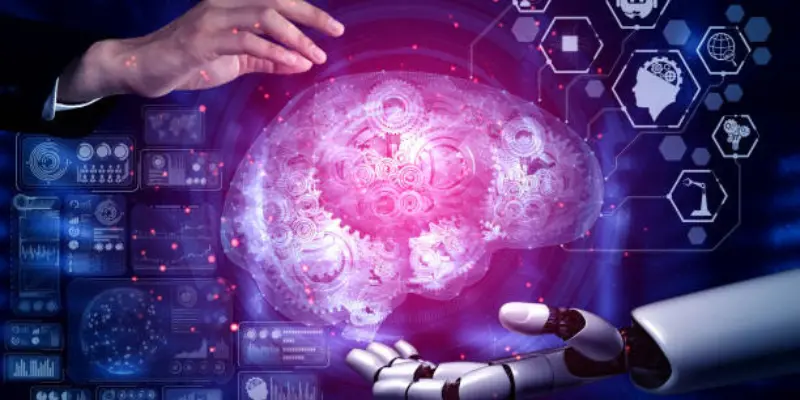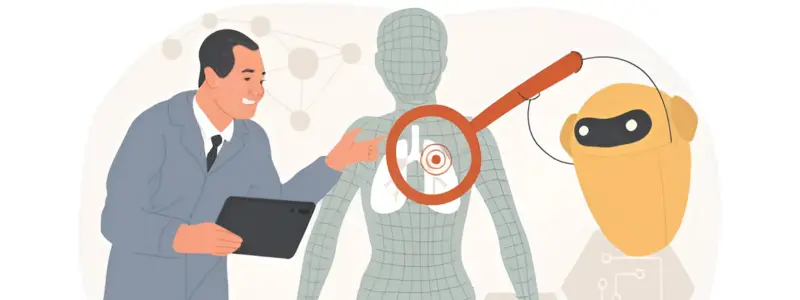Top AI Tools Helping Doctors Fight Cancer
Published: 18 May 2025
Cancer is tricky but smart computer helpers make it easier to spot.
In a recent study, an AI system found breast cancer about 9 percent more accurately than expert radiologists. Now, doctors are widely using AI tools to scan images, find tiny tumors and shape treatment plans. These tools work every minute without getting tired which is obviously not possible for a human being.
In this guide, I am going to tell you about the top AI helpers fighting cancer and you will see real wins from real hospitals and pick up easy tips to use in your next doctor visit. Ready to see how human skill and machine speed team up against cancer?

How AI Fits Into Cancer Care
AI is changing the way of doctors to find, diagnose and treat cancer. It acts like a smart helper that makes cancer care faster and more accurate. Here are the main ways AI helps in cancer care:
Finding cancer early is very important. AI tools can look closely at medical images like X-rays, CT scans or MRIs. These tools spot tiny tumors or unusual spots that are easy to miss with the human eye. This means doctors can catch cancer sooner which often leads to better treatment results. For example, some AI programs can detect breast cancer from mammograms with higher accuracy than some experts.
After AI spots a suspicious area, it helps doctors understand what type of cancer it might be. The AI compares the images or test results to thousands of other cases in its database. This helps doctors quickly figure out the cancer type and decide the next steps. This support saves time and helps in reducing mistakes.
Once doctors know the cancer type, AI helps plan the best treatment. It looks at many factors like the patient’s health, cancer stage and past treatment results. AI can suggest the right medicines, radiation doses or even clinical trials. This allows doctors to customize treatment plans to each patient and improve chances of success and reducing side effects.
Monitoring Progress
After treatment begins, AI tools keep an eye on the cancer’s progress. They analyze new scans or test results and alert doctors if the cancer grows, shrinks or changes. This helps doctors to adjust treatments quickly by making sure patients get the best care all the way through recovery.
Example:
At a leading hospital, AI helped doctors scan lung CT images faster and more accurately. This early detection caught more cases at a treatable stage. One patient had his lung cancer found months earlier thanks to AI, which helped him get treatment sooner and improved his chances of recovery.
Think about this: How might early AI detection change the outcome for someone you care about?
Top 5 AI Tools Doctors Use Today
Doctors today use many AI tools to get help in fighting against cancer. These tools assist in detection, diagnosis, treatment and monitoring. Let’s look at some of the top AI tools making a real difference in cancer care.
1). Google’s DeepMind for Breast Cancer Screening
Google’s DeepMind uses advanced AI to analyze mammograms and spot signs of breast cancer earlier and more accurately. It learns from thousands of images to recognize tiny changes that might be missed by humans.
- What It Does: DeepMind scans breast images and flags suspicious areas with high accuracy.
- Real-Life Example: In a large study, DeepMind helped in reducing false positives and false negatives by about 9%. This means fewer women had to go through unnecessary tests and more cancers were caught early.
- Why It Matters: Faster and more accurate screenings reduce patient stress and speed up treatment.
- Quick Tip: If you get a mammogram, ask your doctor if AI tools like DeepMind are used in your clinic.

Also Read: AI Software for Dental Activities
2). IBM Watson for Oncology
IBM Watson for Oncology is an AI tool designed to help doctors create personalized treatment plans for cancer patients. It works by reading and understanding medical records, scientific research and clinical guidelines very quickly. This helps the doctors to find the best treatment options for each patient.
- What It Does: Watson analyzes a patient’s medical information which includes test results and cancer type. It then compares this data with a huge database of cancer studies and treatment plans. Based on this, it suggests the most effective treatment options.
- Real-Life Example: At several hospitals, doctors have used Watson to speed up their decision-making. For instance, a hospital in India reported that Watson helped doctors identify the right chemotherapy drugs faster than before. This allowed patients to start treatment sooner.
- Why It Matters: Cancer treatments can be complex and new research is published every day. Watson helps doctors stay updated and make choices based on the latest information. It also ensures treatments are personalized to the patient’s unique case.
- Quick Tip: When discussing your treatment plan, ask your oncologist if they use AI tools like IBM Watson to support their decisions. This can help you understand how your treatment is chosen.
3). PathAI for Digital Pathology
PathAI is an AI tool that helps doctors examine tissue samples called biopsies to find cancer cells more accurately. It works alongside pathologists, who study these samples under a microscope.
- What It Does: PathAI uses smart AI algorithms to highlight areas in the tissue where cancer cells might be present. It also helps grade how severe the cancer is which guides doctors in diagnosis and treatment planning.
- Real-Life Example: In studies with lung and colon cancer samples, PathAI helped to reduce errors and improved the accuracy of diagnoses. This means patients get the right treatment faster.
- Why It Matters: Diagnosing cancer correctly is crucial. Mistakes can delay treatment or lead to the wrong therapy. PathAI supports pathologists by double-checking samples and catching things that are easy to miss.
- Quick Tip: If you have a biopsy, ask your doctor if your lab uses AI tools like PathAI. These tools can add an extra layer of accuracy to your diagnosis.
4). Aidoc for Radiology
Aidoc is an AI tool that helps radiologists analyze medical scans like CTs and MRIs quickly and accurately. It focuses on finding urgent problems that need fast attention.
- What It Does: Aidoc scans images in real time and flags any abnormalities such as tumors, bleeding or blockages. This helps the doctors to prioritize cases that need immediate care.
- Real-Life Example: Several hospitals using Aidoc have reported faster scan reviews and quicker treatment starts. For example, emergency patients with brain tumors or bleeding were identified sooner which improved outcomes.
- Why It Matters: In cancer care, time is critical. Aidoc’s speed helps doctors to catch dangerous changes early and start treatment without delay.
- Quick Tip: When you have a scan, ask if AI tools like Aidoc assist the radiologist. Knowing your images get fast and expert attention can give peace of mind.
5). Tempus for Precision Medicine
Tempus is a powerful AI tool that helps doctors create highly personalized cancer treatment plans. It does this by collecting and analyzing a large amount of information about a patient’s tumor, including its genetic makeup. This helps doctors understand exactly how the cancer behaves and which treatments will work best for that specific patient.
- What It Does: Tempus studies genetic data from the patient’s tumor and compares it with thousands of other cases. It then suggests targeted medicines or therapies that are more likely to be effective based on the tumor’s unique characteristics.
- Real-Life Example: Tempus has helped many patients with rare or hard to treat cancers in order to find the right treatments. For example, a patient with a rare form of lung cancer was matched with a targeted drug through Tempus’s analysis, leading to better results than standard therapy.
- Why It Matters: Cancer is not the same for everyone. Personalized treatment based on genetics can improve success rates and reduce side effects. Tempus helps doctors tailor care specifically to each patient’s cancer profile.
- Quick Tip: Talk to your oncologist about genetic testing and whether AI tools like Tempus are part of your treatment plan. Personalized medicine is becoming a key part of modern cancer care.
Quick Tips Before You Trust an AI Tool
AI tools can be powerful helpers in cancer care but it’s important to use them wisely. Here are some quick tips to keep in mind before trusting an AI tool:
Check Approval
Make sure the AI tool has approval from trusted health authorities like the FDA (Food and Drug Administration) or local medical regulators. This shows the tool meets safety and quality standards.

Ask Your Oncologist
Don’t hesitate to ask your doctor, “How will this AI change my care plan?” Understanding how the tool helps can give you confidence in your treatment.
Look for Peer-Reviewed Studies
Ask if there are scientific studies that prove the AI tool works well in real hospitals. Peer-reviewed research means experts have checked the tool’s results deeply.
Protect Privacy
Make sure the hospital or clinic keeps your medical data safe. They should use strong encryption and follow privacy laws to protect your information from hackers.
Remember: AI is a tool to help doctors not replace them. Always talk openly with your healthcare team about your care.
Have you ever asked your doctor about AI tools? What was their response? Let me know in the comments
Conclusion
So guys! In this article, we’ve covered AI tools for cancer in detail. I recommend keeping an open mind about AI in medicine, as it can offer faster and more accurate care when combined with expert doctors. Remember, these tools are here to help you get the best treatment possible. If you want to stay updated on how AI is changing cancer care, keep reading and ask your doctor about the options available to you.
More Queries?
Here are frequently asked questions about AI tools for Cancer:
AI cancer tools are not yet available at all hospitals and clinics. Availability varies by location with larger research hospitals and cancer centers more likely to have adopted these technologies. Ask your healthcare provider if they use AI tools in their diagnostic or treatment processes.
Most AI tools are purchased by hospitals and integrated into existing procedures, not billed separately to patients. The cost is typically built into the price of scans, tests or consultations you are already receiving. Insurance coverage for AI-assisted diagnostics is improving as these tools become more standard in care.
AI tools cannot and are not designed to replace human doctors in cancer care. They serve as supportive tools that help doctors make better decisions by analyzing data more quickly than humans can. The final diagnosis and treatment decisions still require a doctor’s expertise and judgment.
The main risks include potential for algorithmic bias if the AI was trained on limited populations. There’s also the risk of overreliance on technology, technical failures or misinterpreting AI recommendations. This is why AI tools are designed to work alongside human doctors who can verify results.
While accuracy varies by tool, many AI systems now match or exceed human experts in specific tasks. For example, some breast cancer detection AI achieves 9% higher accuracy than radiologists in certain studies. However, the best results come from combining AI analysis with human expertise.
Training advanced cancer detection AI systems typically takes months to years. The process requires feeding the system thousands or even millions of medical images with confirmed diagnoses to learn patterns. Once trained, however, these systems can analyze new images in seconds or minutes.
Patients can ask if alternative AI analysis is available but this is not standard practice yet. Many hospitals use only one AI system for each application, similar to how they use specific medical equipment. You can always request a human second opinion if you have concerns about AI-assisted diagnosis.
AI systems may struggle with extremely rare cancers if they were not well-represented in training data. However, tools like Tempus can analyze genetic data to find similarities to known cancers, potentially helping even with rare cases. Human specialists remain crucial for diagnosing unusual presentations.
When AI and doctors disagree, the doctor’s judgment typically prevails. Doctors view AI as a supportive tool, not the final decision maker. Good medical practice involves investigating discrepancies, perhaps ordering additional tests or consulting colleagues for challenging cases.
Medical AI systems must comply with healthcare privacy laws like HIPAA in the US. Patient data should be encrypted, anonymized when possible and restricted to protect privacy. Hospitals have data security protocols but patients should ask about specific protection measures for their information.





